
VOL. I NO. 3 DELHI, THURSDAY OCTOBER 1, 1942.
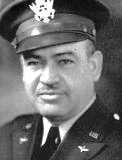
|
Famous Multi-Motor Pilot Now Brigadier
Newest Brigadier General in the C.B.I. Theater is Caleb V. Haynes, commanding the mediums of the China Air Task Force, which since July 1 have been delivering explosive hardware on Jap air bases and other military objectives in occupied China, French (?) Indo-China and Burma, causing the Monkey-men to grind their big buck incisors right down to the gums in impotent rage.
He ranks from September 14.
Some 47 years ago our new Brigadier General was the pick of the crop in Mount Airy, North Carolina, and ever since May 1917 he has been piloting Army airplanes non-stop. Among his peacetime feats was the record air delivery of Red Cross supplies to Chile at the time of the big earthquake there in the one and only B-15. For this flight he was awarded the Mackay Trophy and also Chile's hottest medal.
THREE D.F.C.'S
Additionally, in this war he has won the Distinguished Flying Cross three times as well as a Silver Star medal.
Before coming to this theater General Haynes saw service in England, Africa, Iraq, Iran, Trans-Jordan and Puerto Rico. He came here to take command of the India-China relay of the Ferry Command just as things went all to hell in Burma. Under his personal leadership a record of air evacuation was established. In a ten-day period before Lashio and Myitkyina air bases were taken by the Japs, 3,608 evacuees and an additional 623 wounded soldiers were ferried to safety in Assam.
HEROIC EVACUATION
The handful of planes operated continuously with overloads and on one flight 78 evacuees were jammed into a cabin designed to carry sixteen passengers. All this was accomplished without the loss of a single plane and in addition to carrying out people, the returning planes brought in ammunition and weapons to the hard-pressed defenders.
General Haynes then organized and led the me3dium bombers into China where his often personally led forays have caused mass insomnia among the military to a point where a Nip can't take a nap.
You will hear more of this typical Army Air Force flying general.
|
GHURKA JERKA This will introduce Theodore Mustapha Spirochitum Khan, a good and slothful servant. Theodore Mustapha Spirochitum Khan says that he worked for me for seven weeks while I was in New Delhi, and that he found me satisfactory but undistinguished. Although I came to him with the best of references (A U.S. on my collar and an open American countenance), he feels he must report some slight disappointment in me. In the first place I did not give him presents all the time, although he reminded me frequently that his last employer, a certain Mrs. Doris Duke Cromwell, gave him a house in Westchester, every time he said "Salaam Memahib" - which was quite often. Moreover, I was noisy when I came in during his afternoon naptime and he objected to my sleeping in the hall outside his room when he was entertaining the dhobi, the dwaba, the dumbo and dothers. My insistence on using my toothbrush twice a day caused him considerable trouble because a damp brush is not good for cleaning brass. Although he had taken it for granted that I would be a Major soon, I never did get past a First Lieutenancy during the seven weeks of our relationship and this caused him constant embarrassment in the pantry and the service bar. "There goes Mustapha Spirochitum Khan," other bearers used to whisper. "You know, the one whose master, hasn't even been recommended." However, he did manage to keep on speaking terms with his confreres by wearing both my Distinguished Flying Cross and its ribbon at the same time. It is with great pride, therefore, that I recommend you to Mustapha Spirochitum Khan. If he is considering you for his master you must be a wealthy and powerful man. From the hospital bed on which I suffer from acute inferiority complex, chronic dhobi itch and sever bearer bitch, I salute you. Signed L.B.D. |
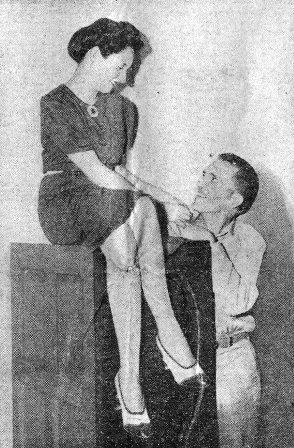 PIPE THE GAMS, CHUMS! - Yvonne H. Mason, said to have the veddy, veddy best underpinning in India, shows Lt. I. F. Haxel how he should wear his gold bar under the new officer insignia regulations. Haxel once gained fame with a stirring defense of Oklahoma and all its works. - Palinkas photo.
PIPE THE GAMS, CHUMS! - Yvonne H. Mason, said to have the veddy, veddy best underpinning in India, shows Lt. I. F. Haxel how he should wear his gold bar under the new officer insignia regulations. Haxel once gained fame with a stirring defense of Oklahoma and all its works. - Palinkas photo.
|
RANK INSIGNIA ABANDONS SHOULDER; GOES TO COLLAR
It used to be "strictly off the elbow" but now it's off the shoulder for officers in the United States Army.
Recent orders from the War Department have taken the insignia of rank off the shoulders of field uniforms and an officer now wears one ornament on his collar in place of the "U.S." For blouses insignia remain the same.
In addition one insignia is now worn on the left front side of the garrison cap. Various instructions as to how many inches here or there and other technical details have been given and have long since gone out in official orders to all concerned. No official reason has been given for the change, however, which has led to much speculation.
The most popular belief is that the change was brought about by feminine pressure - women writing indignant letter to the War Department about getting their checks scratched, etc. Others insist that it was all brought about by insignia getting in the way of webbing and musette bag straps and being torn off.
One of the first to make the change was Lt. I. F. Haxel who naturally got Yvonne H. Mason to pin his bar on his collar. (Photo at left).
BRITISH-AMERICAN DANCE ANNOUNCED
"Hands Across the Sea" has become a working slogan for the British and American troops stationed in Delhi. The latest manifestation of this tendency toward fraternization is the announcement by the Headquarters Squadron of the Tenth U.S. Air Force that it is giving a dance for the Warrant Officers and Sergeants of the 151st Parachute Battalion on Saturday night, October 3, (8:00 to ?), at the Postal Telegraph Grounds.
All American troops stationed in our theater who happen to be in New Delhi on that night are invited to attend. In addition to promising girls galore and some entertainment, the sponsors insist that they will have the best "Hot" band in town. Louis' Jazz Band has been engaged for the occasion and special attention has been paid to coaching it to perform in good old Yankee "Jumpin' Jive" style. Refreshments will be served.
AMERICAN BOMBERS ATTACK AERODROME
Chungking - United States Army Air Force bombers attacked Gailam aerodrome in Hanoi recently according to an American communiqu .
The bombing mission had fighter escort and was intercepted by a large number of Jap planes. Three of the enemy ships were destroyed plus two probables and several damaged. All American planes returned.
In addition, fighter planes of the China Air Task Force attacked Jap truck columns totaling 30 vehicles on the Lungling-Tungyueh Road in southern Yunnan. From 12 to 20 vehicles were destroyed.
MODERN AMERICAN TRAGEDY: POLICE GAZETTE BANNED
New York - Because of "obscene and nude pictures captioned 'snappiest of all pictures'" the Post Office Department has banned the Police gazette from the mails.
Founded in 1845, the Gazette started with wood-cuts of hourglass girls and murders of the moment. The old-fashioned curly-cued cover remained the same as did the color - pink, but its girls got nakeder with each succeeding year.
The magazine once adorned every barbershop table and brought about the famous gag: "Seen the Gazette this week?" Answer - "No, I shave myself."
H. Roswell, Gazette publisher, stated he intends asking for a Congressional investigation. "The censors think the Gazette is all right. Only the Post Office finds beautiful girls obscene," he declared.
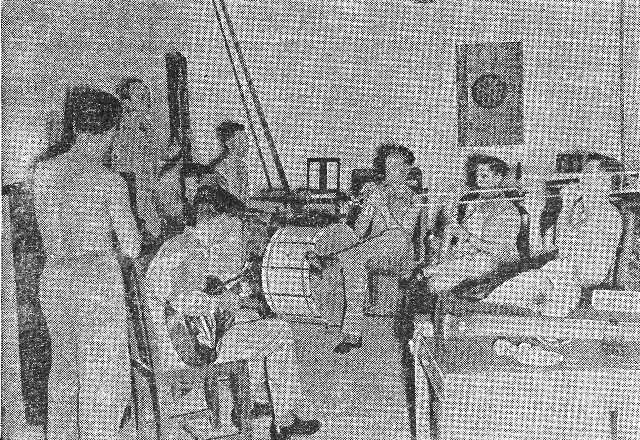 THERE'LL BE HOT JAM SESSIONS when these guys get in shape. S/Sgt. Glenn T. Matthew plays the sax, Pvt. Cliff M. Barnes
tongues the trombone, S/Sgt. Edwin Davis plays the trumpet, S/Sgt. Bill Baker knocks out a lot of percussion on the drums
while S/Sgt. William Hackney slaps the bull fiddle for plenty of jive. Corp. C. L. Sizemore is the old guitar strummer,
Tony Mercado, sans shirt, is the manager, and Corp. George Little sits at the piano. Seems to be some argument whether
the latter is the pianist or just sitting in for the laughs.
THERE'LL BE HOT JAM SESSIONS when these guys get in shape. S/Sgt. Glenn T. Matthew plays the sax, Pvt. Cliff M. Barnes
tongues the trombone, S/Sgt. Edwin Davis plays the trumpet, S/Sgt. Bill Baker knocks out a lot of percussion on the drums
while S/Sgt. William Hackney slaps the bull fiddle for plenty of jive. Corp. C. L. Sizemore is the old guitar strummer,
Tony Mercado, sans shirt, is the manager, and Corp. George Little sits at the piano. Seems to be some argument whether
the latter is the pianist or just sitting in for the laughs.
|
SOLDIERS HIT THE DRINK
AT "DUCKY" SWIM GALA
SPLASH! . . . Sgt. Marshall Cohen fell into the water in full G.I. attire. SPLASH! . . . in went Corp. Stanley Kogut, dressed in fatigues. Another SPLASH . . . this time it was Sgt. Jesse McCorkle Jr., also wearing a suit of fatigues. A final SPLASH . . . Corp. Eugene Eber, sporting a neatly pressed suit of khakis, hit the water hard. The crowd went hysterical at these antics and their laughter reached a crescendo when the soldiers inaugurated a violent dunking spree.
It all happened at the Swim Gala held Saturday evening by the Children's Aid Society of Delhi at the palatial home of Shankar Niwas. Some of our boys had entered the swimming contests and Sgt. Cohen was announcing the next event. Suddenly, Corporals Kogut, Eber and Sgt. McCorkle came milling through the audience yelling that they wanted to go swimming right then and there.
They gathered around Sgt. Cohen, who by this time was threatening them with expulsion from the grounds . . . and then it happened! . . . When it was all over, there were four G.I.'s flailing about in the water.
What the audience did not know was that the whole incident had been prearranged and carefully rehearsed. It was the American soldiers' way of contributing to the fun. One Yank, T/Sgt. T. P. Durrete, did his bit with a smooth swan dive, a neat one-and-a-half and a perfect jack-knife.
Pvt. Ralph Romano and Corp. Charles Davenport gave an exhibition of swimming "Then and Now." Pvt. Romano gathered some prizes during the evening, one of which was for defeating Pvt. Mead in a race. Everybody tried hard and the audience was duly appreciative.
But our boys were not done yet. They topped off their portion of the program with a climactic stunt. Corp. Kogut decided that he was going to serve tea IN the pool to Pvt. Romano and Corp. Davenport. As the audience watched carefully, Corp. Kogut received a tray of tea from one of the bearers. With the tray carefully held above his head he made his precarious way over to the other swimmers by the slow process of treading water. He was doomed to failure, however. Water from the pool filled the cups. The boys made their exit in a spray of water served by swishing teacups.
|
CORPORAL GEE EYE 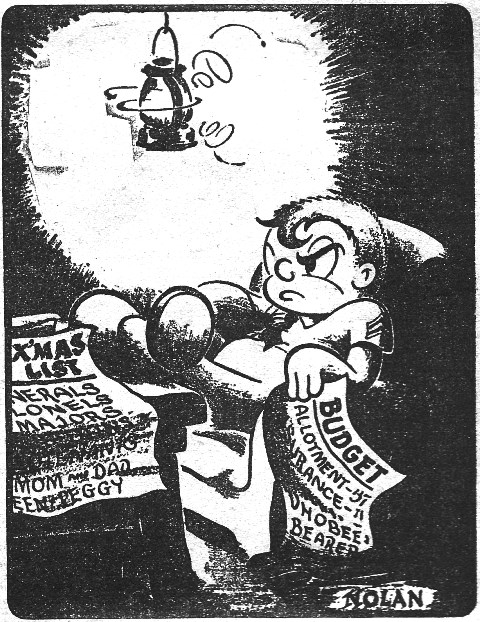
|
CHINA TASK FORCE
MOPS UP JAPANESE
Chungking - The China Air Task Force commanded by Brigadier General Claire L. Chennault, exploded all over China again last week, making life generally miserable for the already emotionally upset Jap.
According to an official communique from the Stilwell headquarters here, American fighters and bombers made a series of raids up and down the Burma Road on Sunday. Japanese installations and lines of communications in southwest Yunnan, west of the Salween River were attacked with a number of fires being started.
In sweeps along the Burma Road, American planes strafed five groups of Japanese barracks. Flying down the road as far as Wanting the fighters destroyed eighty trucks and seriously damaged three Jap tanks. All American planes returned to their bases.
Early this week the Americans made three bombing and two strafing attacks on a Jap column near Lungling inflicting heavy casualties.
RECIPROCAL LEND-LEASE?
Major P. H. Lash, member of the Osmun group, bought a rug a while back for an unknown number of rupees.
He took it to the courtly old gentleman who runs the rug mart in the Imperial Hotel and asked him to sell the rug for say Rs. 200 or some such price. He then went on about his business.
A couple of weeks later he walked in to see how the rug deal was coming on and an assistant who didn't recognize him tried to sell him his own rug for double the price stipulated.
"If you think I'm a chump," Lash said, "you should talk to our newest wholesale jeweler, Major Nowakowski!"
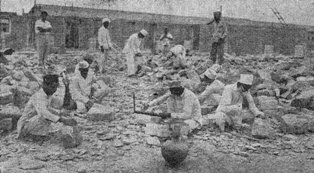 A HOSPITAL IS BUILT - Literally carved out of the Indian landscape is one of the great U.S. Base Hospitals now in
operation. Staffed by expert doctors and trained nurses and equipped with all the gadgets of modern medical science,
this hospital is now efficiently handling the American Army sick.
A HOSPITAL IS BUILT - Literally carved out of the Indian landscape is one of the great U.S. Base Hospitals now in
operation. Staffed by expert doctors and trained nurses and equipped with all the gadgets of modern medical science,
this hospital is now efficiently handling the American Army sick.
|
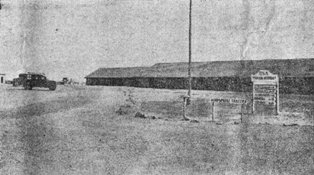 MOST SERIOUS CASES are sent here from all over the theater. The picture at left shows Indian stone masons
laboriously constructing what is seen above as a finished hospital structure.
MOST SERIOUS CASES are sent here from all over the theater. The picture at left shows Indian stone masons
laboriously constructing what is seen above as a finished hospital structure.
|
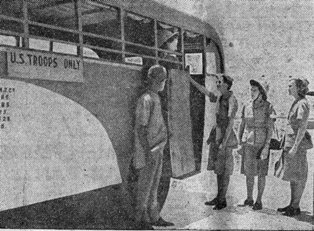 THE NURSES travel by bus back and forth between town and the hospital. Janet E. Conklin is in the vehicle while
Elizabeth Shaunty, Monica L. Gabel and Jane D. Marsden, all "shave tails," line up to get in.
THE NURSES travel by bus back and forth between town and the hospital. Janet E. Conklin is in the vehicle while
Elizabeth Shaunty, Monica L. Gabel and Jane D. Marsden, all "shave tails," line up to get in.
|
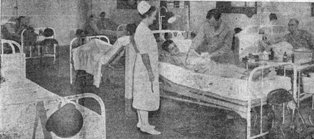 IN GENERAL SURGICAL ward 2nd Lt. Mary Larkin watches Capt. Charles W. Orr apply a fresh dressing to Corp. Edward
R. Dillon.
IN GENERAL SURGICAL ward 2nd Lt. Mary Larkin watches Capt. Charles W. Orr apply a fresh dressing to Corp. Edward
R. Dillon.
|
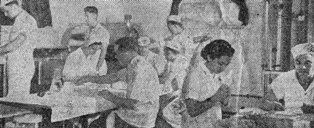 READY TO CARVE - Before going in to the operating theater to delicately disect the gizzard of some poor sucker
everybody gets thoroughly cleaned up. It's all done in the "Sterilizing Room" shown above.
READY TO CARVE - Before going in to the operating theater to delicately disect the gizzard of some poor sucker
everybody gets thoroughly cleaned up. It's all done in the "Sterilizing Room" shown above.
|
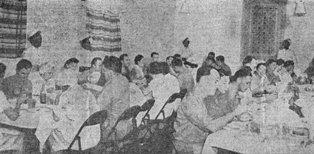 COME AND GET IT! - Even doctors and nurses must eat, so here they are presented in their mess hall eating either
mutton or chicken we'll bet.
COME AND GET IT! - Even doctors and nurses must eat, so here they are presented in their mess hall eating either
mutton or chicken we'll bet.
|
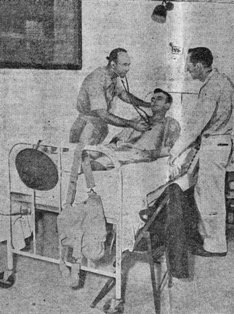 CHECKING THE TICKER - Observe the air of calm resignation on the face of Capt. Frank H. Waskow as Capt. Ivan W. Scott
checks his old pump. Capt. Robert S. Crew is probably there for consultation or to fill up the picture.
CHECKING THE TICKER - Observe the air of calm resignation on the face of Capt. Frank H. Waskow as Capt. Ivan W. Scott
checks his old pump. Capt. Robert S. Crew is probably there for consultation or to fill up the picture.
|
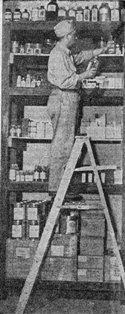 Pvt. Arnold L. Olson sorts all those "CC" pills you guys get.
Pvt. Arnold L. Olson sorts all those "CC" pills you guys get.
|
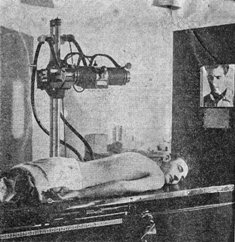 ON THE TABLE is 1st Sgt. Marvin T. Hunn while looking down his throat is Corp. Emanuel B. Rivera. Captain writer says
it is "Gastro-Intestinal" study, whatever that is.
ON THE TABLE is 1st Sgt. Marvin T. Hunn while looking down his throat is Corp. Emanuel B. Rivera. Captain writer says
it is "Gastro-Intestinal" study, whatever that is.
|
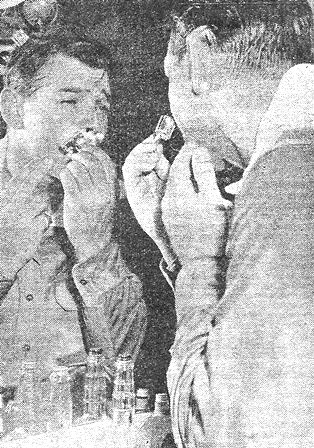 CLARK GABLE, the movies' great he-man heart-throb, shaves off his moustache his first day at an Army Air Force school in Florida.
Gable walked right in as a private and asked to be made an airplane gunner when he enlisted.
CLARK GABLE, the movies' great he-man heart-throb, shaves off his moustache his first day at an Army Air Force school in Florida.
Gable walked right in as a private and asked to be made an airplane gunner when he enlisted.
|
Fighter Plane Bests Zero; Messerschmitt
Washington - United Nations air experts pay high tribute to the improved design of American P-40s, a series commonly known as the Kittyhawk or Tomahawk.
An official report from the British Middle East Command states:
"Pilots in the squadrons equipped with Kittyhawks consider these planes superior to the Germans' Messerschmitt 109."
Lieutenant Colonel John Moore-Brabazon, British ex-Minister of Aircraft Production, recently cabled the makers of the P-40:
PROOF OF PUDDING
"Pilots tell me again and again how they relish the performance, maneuverability, and range of the Kittyhawk. Our successes against enemy fighters and bombers supply the proof. We can use all you can send."
Major General G. C. Kenney, Commander-in-Chief of the United Nations air forces in the southwest Pacific declares:
"In all my travels, I have not met an American or Australian pilot who would trade the Curtiss Kittyhawk for a Japanese Zero."
John J. McLoy, U.S. Assistant Secretary of War, in addressing veterans of the last war recently, stated:
"TWO TO ONE"
"Two to one, the destruction of Japanese planes is due mainly to the performance of the P-40s."
Squadron Leader Oliver Caldwell, an Australian ace pilot credited with downing 19 Axis planes, asserts:
"The American Kittyhawk certainly can get around much more neatly than the Messerschmitt 109."
A recent survey of Russian airmen gives the Kittyhawk a preferred rating. Compared with the first plane of the P-40 series issued in 1937, the new P-40 has vastly increased in striking power, speed and altitude, declares the survey.
SOLDIERS WITNESS INDIAN CREMATION
Seeing a ceremonial burning of the dead, visiting the centuries-old palace of bygone kings and queens of India, touring the Taj Mahal, were some of the high spots of a recent two-day exploration trip of five enlisted men and one officer of the Air Depot Group.
The enlisted men were: Pfc. Ray Cherry, Sgt. jack Byrom, Corp. Louis Ryba, Corp. Robert L. Snyder, and Sgt. Leroy R. Bergin. With them was 1st Lt. Will R. Underwood, of the Air Depot Group.
Commandeered by photographers of the Public Relations Section of Hq., U.S.A.F.C.B.I., to be the very-willing subjects of a group of publicity photographs, the six men thoroughly enjoyed their two-day detail.
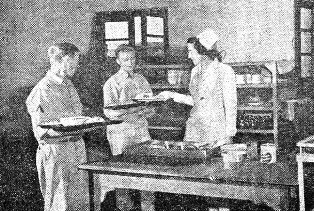 SPECIAL DIETS - Angry patients often insist they're being starved to death in any hospital. Here 2nd Lt. Marie Rowley
hands out some of those "specials" to Pfc. Norman R. Lund and Pfc. Ralph E. Geary.
SPECIAL DIETS - Angry patients often insist they're being starved to death in any hospital. Here 2nd Lt. Marie Rowley
hands out some of those "specials" to Pfc. Norman R. Lund and Pfc. Ralph E. Geary.
|
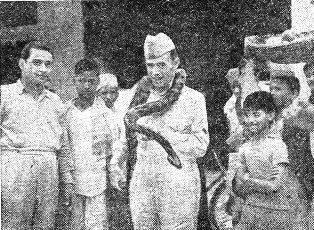 POOR MAN'S SNAKE CHARMER - S/Sgt. Arthur Donovan herewith proves that the art of snake charming is not the exclusive
property of the Indians.
POOR MAN'S SNAKE CHARMER - S/Sgt. Arthur Donovan herewith proves that the art of snake charming is not the exclusive
property of the Indians.
|
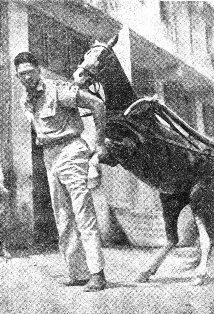 MUSSELMAN? - Or do they mean "muscle-man" when they talk about Pfc. Ervin "Slim" Simmons, calmly walking away with
the front end of a horse.
MUSSELMAN? - Or do they mean "muscle-man" when they talk about Pfc. Ervin "Slim" Simmons, calmly walking away with
the front end of a horse.
|
KNOW YOUR INDIA
(This is the first of a series of articles designed to familiarize U.S. Army troops with India, its people and its ways - Ed.)
Servants are plentiful and cheap in India. Because of the caste system you will find that each servant class may only perform duties belonging to his caste. The sweepers who are employed to keep your barracks clean may not shine your shoes or make your bed because such duties are the proper work of a Bearer. In turn it is beneath the dignity of a Bearer to sweep floors. You must keep this caste distinction always in mind. It is a part of the Indian way of doing things.
Sweepers are employed by the government. Bearers are hired and payed for by the individual who wants their services. In barracks a Bearer is most often employed collectively by a group of soldiers. In such circumstance each man contributes about $1 a month. This is much more than the British soldier pays or can afford since his basic pay is about $5 a month. The Bearer is supposed to be sort of a valet but the system has the imperfections which are bound to occur when one servant has many masters.
The employment of a Bearer does not relieve the soldier of his personal responsibility for a clean and well-ordered bunk, or well-shined shoes. Officers who employ personal Bearers are informed that the British scale of pay ranges from 20 Rupees monthly for a second lieutenant to 40 Rupees monthly for a lieutenant colonel. It is only fair to our Allies not to exceed these rates.
India has no such laundry system as in the United States. Your laundry will be done by a servant called the Dhobi, which also is a caste occupation. The Dhobi is not accustomed to charging for each item cleaned. Here the system is to make a contract price for as much laundry as you will have.
Americans have been paying more than the British for this service. The established price of 8 Rupees a month is said to be high except in the case of officers, some of whom pay as much as 15 Rupees a month. You will find that Dhobis having several customers will get clothing badly mixed, or lost, and there is little you can do about it,
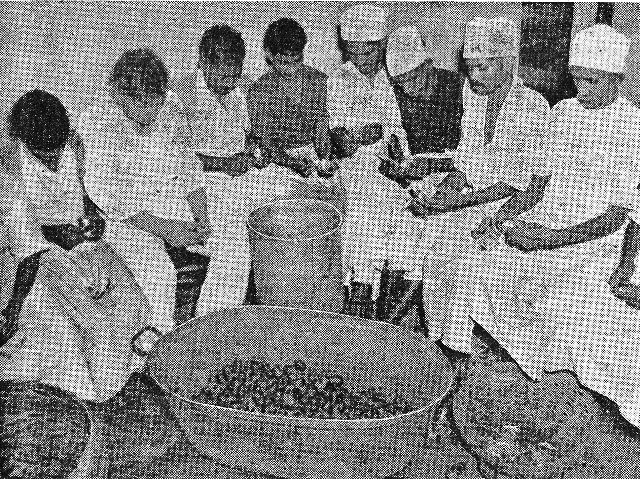 PLENTY OF KP's IN INDIA - Pvt. Steve Salak seldon peels a spud or an onion in dear old India. He usually turns it over to his little body
of hand picked men shown in this picture. For the sake of getting the military into the picture, however, Salak agreed to peel for one potato.
PLENTY OF KP's IN INDIA - Pvt. Steve Salak seldon peels a spud or an onion in dear old India. He usually turns it over to his little body
of hand picked men shown in this picture. For the sake of getting the military into the picture, however, Salak agreed to peel for one potato.
|
The majority of these servants mean well. They have a pride of caste but many are easily confused by American manners, and our language, which does not sound the same to their ears as the more familiar British tongue. Occasionally rascally servants will defraud you in their dealings. It is up to you to be alert to save yourself from being taken for a sucker.
Whatever the provocation you must never strike an Indian servant. It will be enough to report him to your unit headquarters where his pass will be taken up. In general it may be said that Bearers in particular are expert psychologists.
They can size up a man quickly and accurately, be he buck or officer, and it then becomes the Bearer's plan to make himself indispensable. There is nothing wrong in this ambition but the Bearer's success in this regard means a corresponding loss in your own self-reliance.
Personnel servants probably will not be allowed to accompany troops into the field for security and other reasons. If you have forgotten how to clean and check your canteen, make your bunk, shine your shoes and do all the little personal essentials for yourself in the luxury of this cheap and plentiful personal service, you will be the loser. Remember there is no more important asset to a soldier than self-reliance, the ability to do for himself.
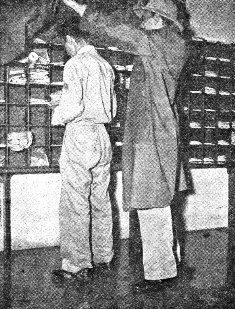 RAINS CAME but plenty a while back and the two gents running the APO had to do a lot of covering up on the mail.
The Army's two postal handlers here are Sgt. Anthony J. (Woeful Willie) Longo and Sgt. Richard Pustorino.
RAINS CAME but plenty a while back and the two gents running the APO had to do a lot of covering up on the mail.
The Army's two postal handlers here are Sgt. Anthony J. (Woeful Willie) Longo and Sgt. Richard Pustorino.
|
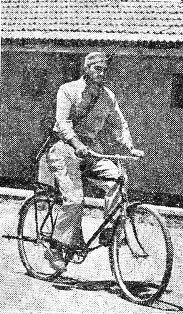 "WALKING POST" - At the theater station hospital Pvt. Edward B. Pieczynski walks his post on a bicycle because of the
great distances to cover.
"WALKING POST" - At the theater station hospital Pvt. Edward B. Pieczynski walks his post on a bicycle because of the
great distances to cover.
|
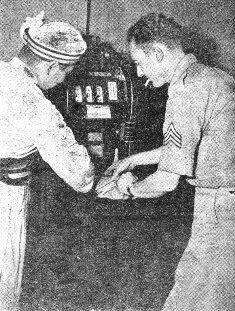 ONE-ARMED BANDITS? You bet there are slot machines in the Far East! Sgt. William F. Cox here holds his cap to
receive that jackpot, but they don't pay off any better here than they did at home.
ONE-ARMED BANDITS? You bet there are slot machines in the Far East! Sgt. William F. Cox here holds his cap to
receive that jackpot, but they don't pay off any better here than they did at home.
|
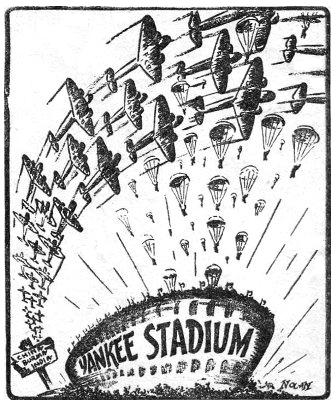
|
OPEN LETTER TO
GENERAL MARSHALL
Dear General:
Remember those days back home when we had a "morale problem?" Remember how you and the Secretary got together and hatched up those long Christmas furloughs for the boys as a partial solution?
Well, we've got a morale problem out here too and we're offering you an easy out right here and now. We want you to send a fleet of Stratoliners over here and take 50 percent of the C.B.I. command home for the World Series.
As soon as you fly them back here we want you to get the fleet ready again to take the other 50 percent home for the Rose Bowl Game. We don't care if General DeWitt still won't let them play the game in Pasadena. We'll got to Durham, Tulsa, Dallas, New York City, wherever the game is played.
The morale problem back in the States, if you remember, was caused primarily by a general lack of understanding of "why we're in the Army" and boredom. Out here the reverse is true. We've been facing too much shot and shell - especially around New Delhi. Us pencil jockeys have been in the "front lines" of this theater of war for from three to eight months and we're just about shot, general. It's been too tough and, anyway, we want to find out why Ted Williams beat Joe Dimaggio for the American League batting championship and what Minnesota is doing without Bernie Bierman.
Since the World Series starts about the time you'll hear of this you'll have to rush it up a bit, general, but we think the whole thing will be a swell little problem for your G-3 section. If the Operations experts can figure out a way to get our first 50 percent in St. Louis or New York City for the first game after that game has already been played the Russians and British can go home and fold their tents. We can handle this war all by ourselves.
Love and kisses, The Roundup
The C.B.I. Roundup is a weekly newspaper published by and for the men of the United States Army Forces in China, Burma, and India, from news and pictures supplied by staff members, soldier correspondents, Office of War Information and other sources. The Roundup is published Thursday of each week and is printed by The Statesman in New Delhi, India. Editorial matter should be sent directly to Capt. Fred Eldridge, Branch Office Hq., U.S.A.F.C.B.I., New Delhi, and should arrive not later than Monday in order to make that week's issue. Pictures must arrive by Sunday and must be negatives or enlargements. Stories should contain full name and organization of sender.

OCTOBER 1, 1942
Original issue of CBI Roundup shared by Gary Goldblatt
The picture of Gen. Haynes did not appear in the original.
Copyright © 2019 Carl Warren Weidenburner
TOP OF PAGE PRINT THIS PAGE ABOUT THIS PAGE SEND COMMENTS
PREVIOUS ISSUE CLOSE THIS WINDOW NEXT ISSUE